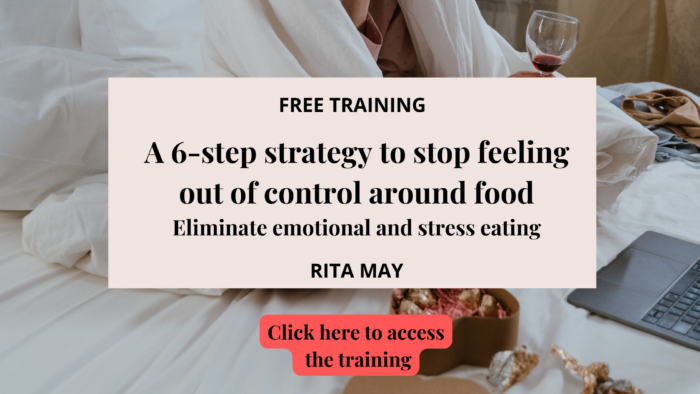
Hi,
I'm Rita May
A scientist turned Emotional Eating and Health Coach.
I help driven professionals and entrepreneurs who are successful in other areas of their life but can’t solve this one challenge: emotional and stress-eating.
My story
I wasn’t always a coach. I actually worked as a postdoctoral researcher and scientist for about 15 years, and it was my personal journey that inspired me to learn about nutrition and eating psychology so that I could help others navigate their health, nutrition and emotional/stress eating journeys.
I obtained my chemist diploma and PhD in Hungary and worked at universities as a postdoctoral researcher in the UK for over 5 years. I met my boyfriend there and we moved together to Switzerland in 2008 and have been living here since.
I have always been interested in health and nutrition so in 2009 when I had a gap year due to moving from the UK to Switzerland, I obtained a Nutrition and Diet Advisor certificate.
Then, I continued to work as a scientist at a research institute on very interesting, green energy projects for 9 years. In the meantime, we had two little boys. We don’t have help from our parents as we don’t live in our home countries. Therefore I went back to work part-time after two very short maternity leaves.
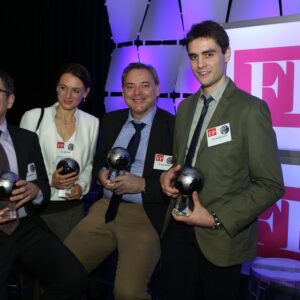
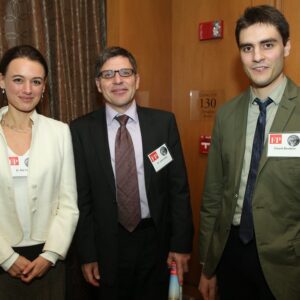



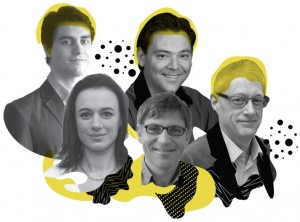
It was an exciting and exhausting time of my life. Our work with my colleagues was featured in the media multiple times, we were also chosen as one of the 100 Leading Global Thinkers in the category Innovators by Foreign Policy (FP, an American political journal). We were invited to Washington for the most amazing event I’ve ever been to. John Kelly gave a speech, I was sitting between FP’s Editor and the Swiss Ambassador.
I learned to be very efficient at time management to be able to have enough time for work, commutes, business travels, family, household chores and friends.
It looked like the perfect life but there was too much pressure on me. It took a lot out of me to keep up with this high-level work and my demanding boss, the two toddlers, and the household duties at home.
Working in research can be stressful. The constant pressure to get the desired results and publish them quicker or in a more prestigious journal than your competitors, long working hours, securing grants and financial uncertainty leave you overworked and stressed.
And I haven’t even talked about the anxiety caused by imposter syndrome yet. Many high-achievers (working in science or other fields) never feel good enough. Especially women.
We cannot believe that we deserve our success and we feel like we were just lucky or we’ve been at the right place at the right time. Despite our experiences and accomplishments, we constantly worry that others will find out that we’re imposters and we don’t know enough. Can you relate?
To compensate, we work even harder and hold ourselves to even higher standards leading to even more overload and overwhelm.
To release this stress many people turn to food to find comfort, reward, relaxation and distraction from their problems.
I already used food to release stress at university during preparation for my exams. I found myself eating to relieve stress again while balancing demanding work in a competitive field, travelling, looking after our small children, and attending to all the other responsibilities.
I was constantly stressed to breaking point, I started to have anxiety, palpitations, and eye twitching, and I was impatient with our little boys. I felt like a failure at work, as a mum, as a partner, and as a friend since I couldn´t give my best in any of those areas.
Sometimes the feeling I would never be good enough drove me to eat emotionally.
I realized that eating healthy food and moving regularly isn’t always enough to live a balanced and healthy life. Because when we don’t have the tools to deal with our emotions and stress, eating can quickly become a comfort or reward after a tiring day or a distraction from our uncomfortable feelings or problems.
Then we repeat this behaviour multiple times and overeating becomes a habit like smoking, drinking, gambling or other addictive behaviours.
The change started when I had to watch people who I like to go through hell due to mental illnesses. It made me realise that it´s not enough to look after our bodies, it´s also vital to look after our mental health.
I mention this because I know there are so many busy, high-achieving people caught in that same cycle of struggle with stress, overwhelm and food.

To learn how to get free from emotional eating I chose an Integrative Health Coaching training that trained me not only about nutrition but also about eating psychology and applying spirituality to get me unstuck and help my clients do the same.
I also learned NLP (Neurolinguistic Programming) techniques to be able to make these changes quicker for my clients than it was for me.
I started to immerse myself in researching self-development to increase my confidence too and I learned that our inner limiting beliefs hinder us to reach our full potential. Our belief system develops in our subconscious mind till the age of 7.
As an adult, we consciously may realize that this belief is not valid for us anymore, since we have grown up and changed, but our subconscious mind does not realize this.
No matter what your purpose or goal is, if your inner belief system is not in alignment with it, you will never reach that goal. Your subconscious mind will always come up with a reason why you are not capable or why it is impossible for you.
Our limiting belief system can also affect our weight so we need to change these limiting beliefs.
I also found that mindfulness can help us become aware of our habits, the foods, environment, or situations triggering emotional eating, and our bodily sensations when we really need food as opposed to when only our brain wants us to eat.
The extra weight is often not about what we eat but about what´s eating us.
I’m grateful that my journey brought me here. To share with others that there is a better way.
Now I’m 47 and have been free from food struggles for years.
Now I want to help other overwhelmed people break free of their emotional eating issues.
I want to show you that you can lose weight permanently without jeopardising your physical and mental health with quick-fix fad diets.
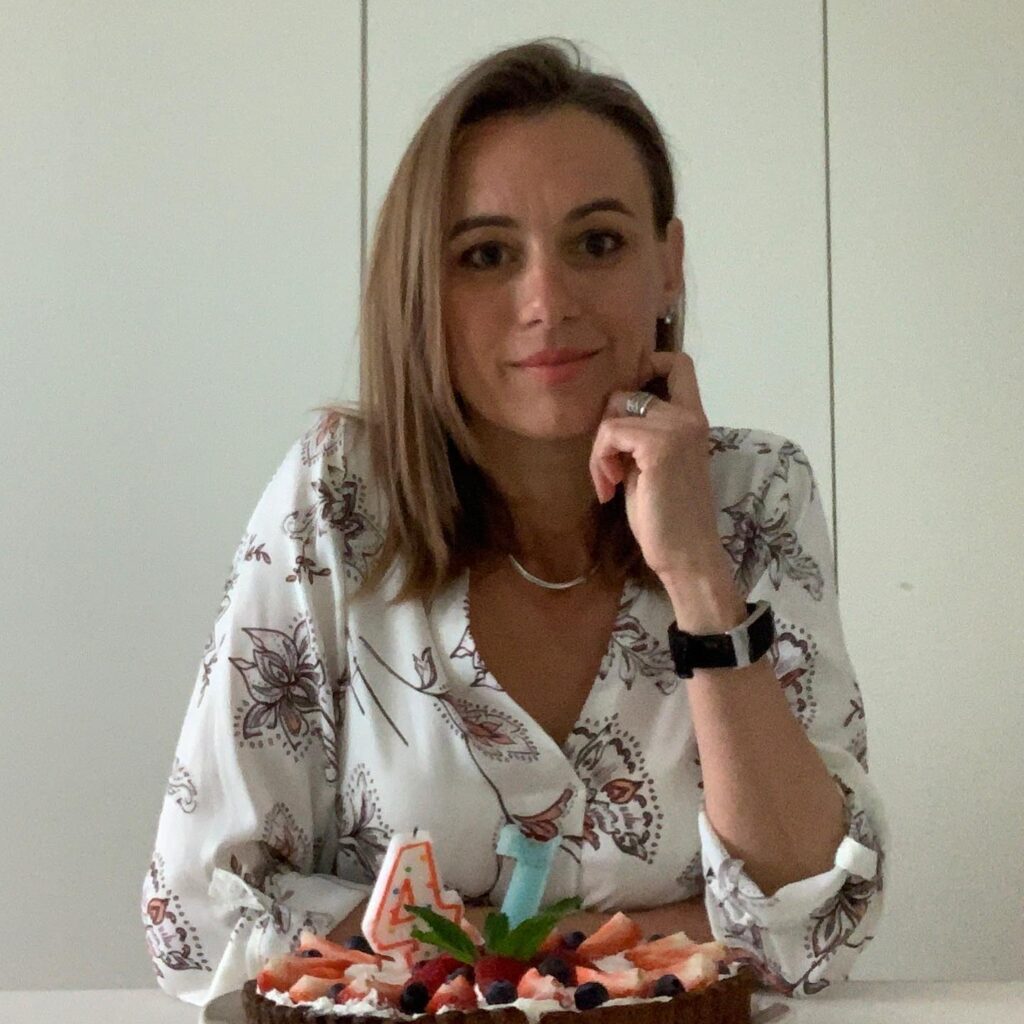
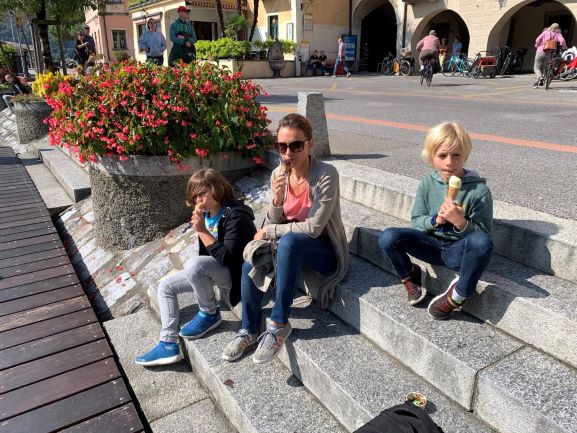
My food choices are not driven by my emotional state anymore. I don’t use food to release stress or make myself feel better.
Food is only needed to fuel and nourish me, and to give me pleasure.
Now I can eat whatever I want whenever I want it… and stay slim.
I can eat chocolate and chips and other not-so-nutritious foods when I feel like it without feeling like I ruined my diet and without the need to turn one cookie into a dozen.
I want the same for you too.
Successful people, like CEOs, entrepreneurs, professionals, researchers, physicians, lawyers, coaches, and leaders, despite all they’ve accomplished, sometimes can’t figure out how to stop overeating.
You know how to solve complicated problems, lead the work of other people, win big contracts, save lives, and solve legal issues but you feel powerless around food.
You’re always busy, your job is stressful, you may even travel a lot, plus you raise a family. The eat-to-soothe stress habit became your release.
Eating is an easily available and quick way to comfort, soothe, and reward yourself when you feel overloaded and overwhelmed. Another “advantage” of eating is that you can do it pretty mindlessly while working or doing something else so you can still meet all the demands.
When it comes to food, we all know that we should eat less when we’re overeating and that emotional eating doesn’t solve our problems. But sometimes we know exactly what to do but we still don‘t do it.
Even when we actually try to do something about it we often don’t realize that the weight loss advice and strategies we follow are the exact things that are making us overeat.
You may think that you just need to find a new, better diet to lose the weight you gained due to emotional or stress eating. You make plans that you’ll eat salad for lunch, eat a healthier snack in the afternoon and start to do some kind of exercise.
But you don’t address the real issue that you overeat when you’re stressed, overwhelmed, anxious, tired, angry, not feeling good enough, sad, lonely, bored, or even when you’re happy.
When we’re really busy, we don’t need more rules or “shoulds.” We need to find out why food is so powerful in our lives in the first place and find other ways to comfort ourselves.
Busy people often don’t take their relationship with food seriously. You probably think it’s only an inconvenience. What you don’t realise is that it affects not only your weight but your health, your confidence, and your self-worth too.
You deny yourself the help and support that could make your life easier because you think you can figure it out yourself but you don’t have time to do so. Or you don’t feel “deserving” of paying for something like this or you have trouble making your needs a priority as there is always something “more important” to do.
As a high-achieving person, you believe that you have to work harder and harder to maintain your success, but if stress and overwhelm are not addressed, this overload leads to exhaustion, food cravings, overeating, and weight gain (or even burnout and depression in the long run).
Then you try to lose weight using the latest popular diet and you always fail. Even if you lose weight, you gain it back because the emotional component is not addressed.
When the diet is over or when life becomes too hectic you turn to food again. Consequently, after many attempts, you’re sceptical, discouraged, unmotivated and tired to try anything new.
You’re probably not even aware that a coach could help you find out what triggers you to overeat and teach you how to react to those situations differently so you can disconnect your mood from food.
As a smart, busy person, you have so much on your mind and have no time to take care of yourself. You need someone to keep you accountable until your new habits become ingrained and automatic.
And this is where I can help you.
My coaching method
My coaching method is based on three pillars: the science of nutrition, psychology, and a bit of brain science.
I don’t believe in the one-diet-fits-all approach. Instead of giving you a diet plan, I help you choose a way of eating that you enjoy because that’s the one you will be able to sustain in the long term.
However, nourishing your body is not enough. Our well-being is also affected by stress, relaxation, thoughts, emotions, beliefs, joy, self-awareness, personal history and so much more.
Therefore, we also focus on learning and implementing simple and effective emotional management tools, updating your belief system and learning to accept and trust your body. By practising using these skills, you’ll change your responses to situations that would’ve led to emotional eating in the past.
My approach considers every aspect of your life. It is entirely personalized to help you in the areas where you need it most, allowing you to make sustainable changes and create a balanced, happy, healthy life.
During my Researcher and Scientist jobs, I supervised numerous Master’s and PhD students and developed the skills to find the best information and teach it effectively. Therefore, you can be sure that I‘ll teach you well-researched information in an easily understandable fashion.
Other very strong skills I developed during my jobs were finding patterns and chains of causation and creating the desired new patterns. These skills are extremely beneficial to help you find your conscious and unconscious eating and thinking patterns and to help you create better patterns.

You are at the right place if
You want to stop eating your feelings and turn to food to cope with your emotions.
You want to master your overeating issues to feel free and have more time to concentrate on the joyful things in your life.
You haven´t reached your full potential because of the lifelong struggle and interdependence around food, eating and body image obsession.
You want to be healthy, live a long life and be a healthy example for your children.
You want to feel sexy, wear pretty clothes and not hide behind baggy shirts.
You want to climb a flight of stairs without panting and without knee and joint pain.
You want to have more energy and sleep better.
If you have questions, please write me an email at hello@ritamayblog.com. I would love to hear from you!
If you think something might be useful or interesting for someone you know, please share my page with your friends, family or followers.
Other random facts about me:
– My real name is Rita Tóth (I published my research articles under this name). I use Rita May for coaching because I don’t like how English-speaking people pronounce Tóth (it’s supposed to be a t at the end, not th) and German-speaking people always joke about being dead (tot means dead in German). And May is my favourite month 😊
– I don’t drink coffee but I can’t live without tea.
– Our sons speak English with their daddy, Hungarian with me, German in school, and Swiss German with their friends.
– I love reading, being in nature and watching films.
– I’m an introvert.
